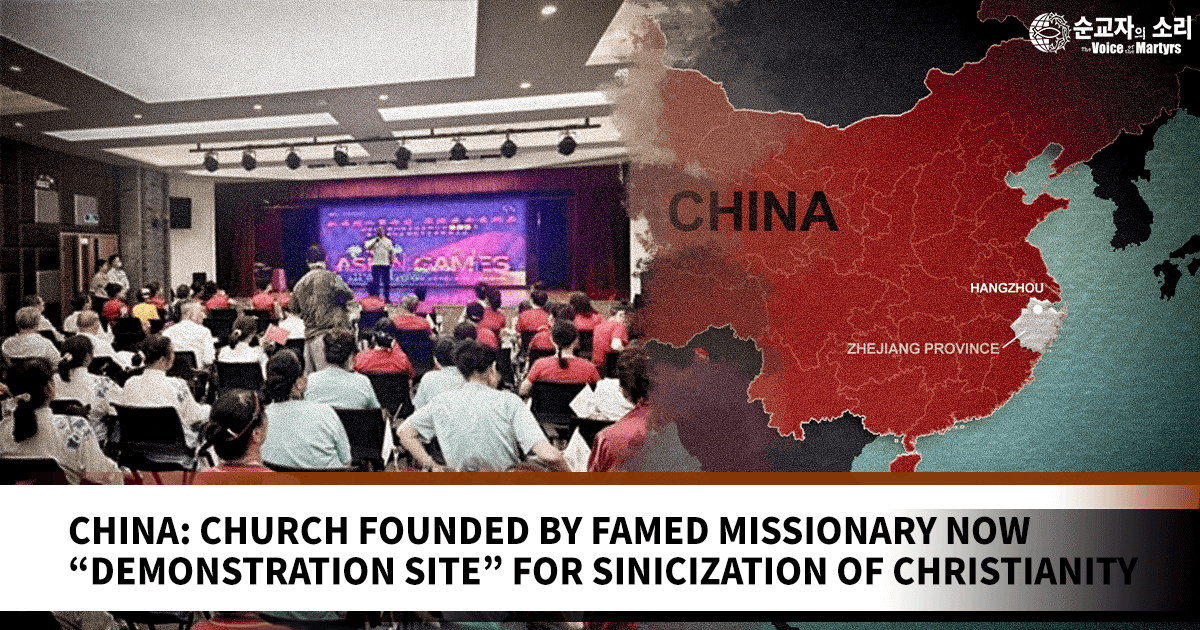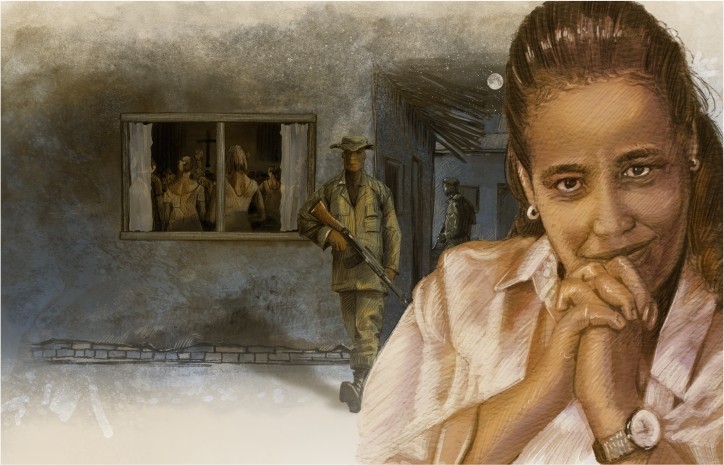A church in Hangzhou, Zhejiang province founded in 1859 by John Nevius, the American missionary famed for his non-traditional methods of church planting and missions, has announced its own new mission: Serving as a “demonstration site” for the Sinicisation of Christianity. According to Voice of the Martyrs Korea Representative Dr Hyun Sook Foley, that new mission was on display in the church’s recent countdown event to the 19th Asian Games, to be held in Hangzhou later this year.
“Sicheng Church is a government-registered church in Hangzhou, Zhejiang province,” says Representative Foley. “Last year they organised a special session on implementing the spirit of the 19th National Congress of the Chinese Communist Party. The church was also honoured at a national conference organised by the government’s United Front Work Department in December 2022. Then on 16 June, Sicheng Church held a ‘100-day countdown event’ for the 19th Asian Games to be held in Hangzhou later this year. None of the content was related to Christianity.”
According to Representative Foley, for the Asian Games countdown the church organised a series of cultural events and athletic performance activities, with the church orchestra performing non-Christian songs. “It was a showcase of traditional Chinese art forms and music—skits, tai chi, dance and athletic exhibitions, and Chinese opera,” says Representative Foley.
On the church’s website, its pastor, Huang Mingke, emphasised the church’s support for the Chinese government’s programme of Sinicisation: “Sicheng Church, as a demonstration site on a provincial level for the popularisation of law, a provincial-level publicity and education base for religion governed by law, a demonstration site for the Sinicisation of Christianity, and a safe religious site, should actively and continuously promote the Sinicisation of Christianity and strive to do a good job of adapting Christianity to a socialist society so that Christianity can truly become China’s Christianity.”
Representative Foley says organisations like hers are concerned by what she calls the “one-way direction” of that adaptation. “There is no process of mutual adaptation between Christianity and Chinese culture in the Communist Party’s Sinicisation process,” she says. “Only Christianity has to adapt to communism; there is no such thing as communism adapting to Christianity. That is why in public events held by government-registered churches like Sicheng Church there is only supportive presentations of communist principles and practices, not presentations of the gospel. This so-called ‘China’s Christianity’ places China, not Christ, at the centre. The only place for Christ in that kind of Christianity is as a cheerleader for communism.”
According to Representative Foley, Sicheng Church’s founder would not have approved. “The Chinese Communist Party took the phrase ‘three-self’ from Missionary John Nevius, the founder of Sicheng Church, but the CCP emptied that phrase of Nevius’ meaning and substituted its own meaning instead,” Representative Foley says. “Nevius’ ‘three-self’ method meant that churches should support themselves, lead themselves, and reproduce themselves. The purpose was not so that the government and the culture could be promoted, but so that there would be nothing to hinder the spread of the gospel. In fact, Nevius’ method was sometimes criticised in its time because it focused completely on spreading the gospel and the Bible, not on planting new churches. To Nevius, a church only existed in order to make the gospel known. But now the church that he planted, Sicheng Church, has taken as its mission the making known of Chinese culture and communism, not the gospel.”
Representative Foley believes the change in focus may have been the reason Chen Fengsheng, the church’s previous pastor, resigned. “He served Sicheng Church for seven years but officially resigned on 1 July,” says Representative Foley. “He did not give a reason for his resignation. However, it is noteworthy that his resignation coincided with Sicheng Church’s growing identity as a ‘demonstration church’ for Sinicisation.”
Sicheng Church is one of the oldest remaining Christian churches in Hangzhou. It originated from the Northern American Presbytery and was established by American missionary John Nevius in 1859. In 1868, it was set up as a preaching station in a rented house on Pishi Lane by Chinese pastor Zhang Chengzhai. Four years later, the church purchased a three-room hall in Fengle Bridge to serve as a chapel. As the number of believers increased, a new church building was completed on the same site in 1927. During the Cultural Revolution, Sicheng Church was converted into a warehouse for the government’s Hangzhou Library. With the implementation of new religious policies in 1981, the church property was returned, and Sicheng Church reopened. On 30 August of the same year, a ceremony was held to commemorate the reopening of the church.
“Throughout its history, Sicheng Church has faced many tests of faith,” says Representative Foley. “We pray that it will yet pass this test, too. Missionary John Nevius once wrote that ‘churches should be encouraged to grow by throwing out shoots in the same manner as the strawberry plant’. Perhaps Sicheng Church’s former pastor Chen Fengsheng and other Sicheng Church members who have left are in reality like shoots of the strawberry plant. Maybe the Lord will use them to one day restore Sicheng Church and other ‘three-self’ government churches in China to the true three-self method of John Nevius so that these churches can once again be ‘demonstration sites’ for the gospel, not the Chinese Communist Party.”




Submit a Prayer